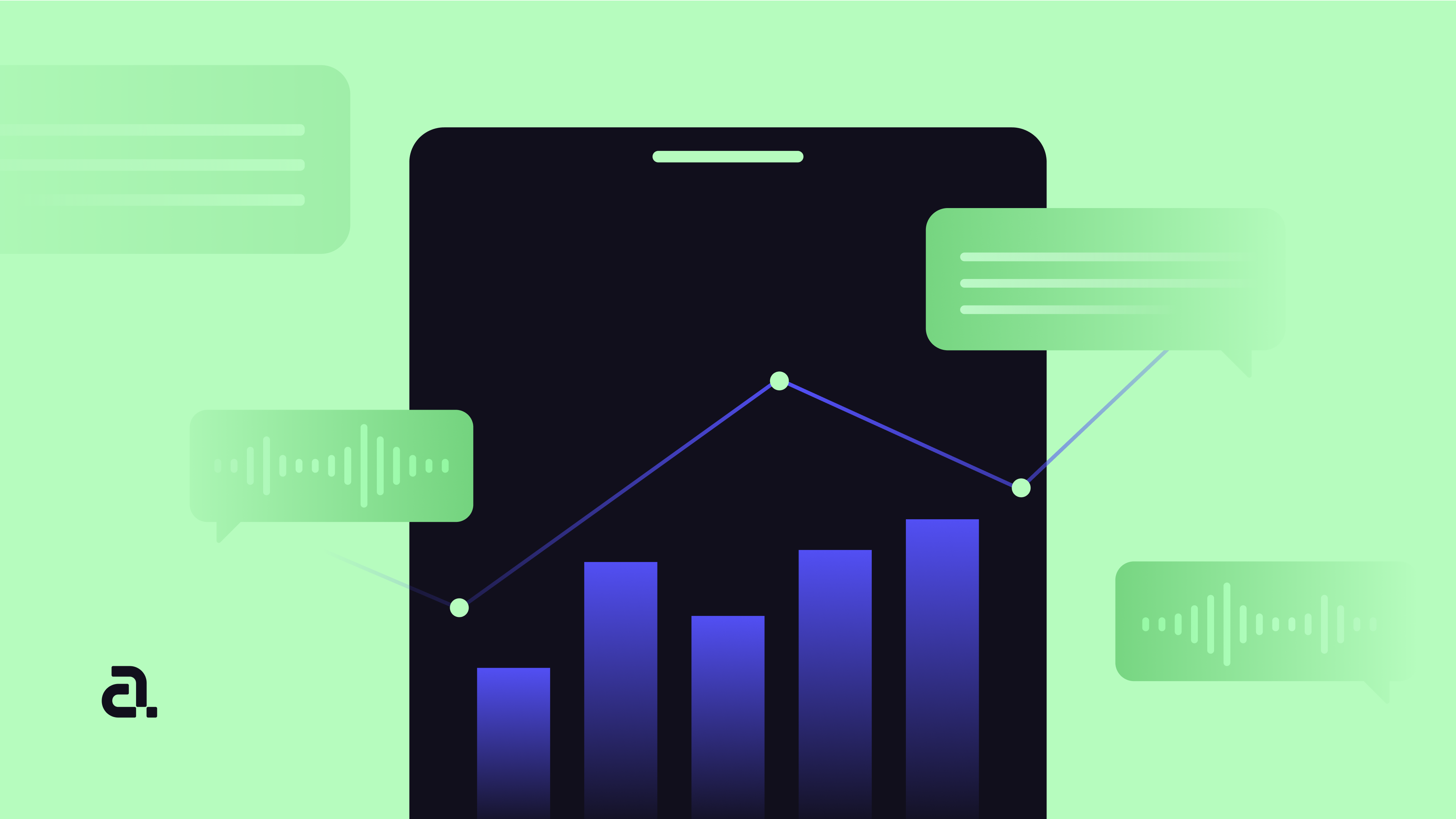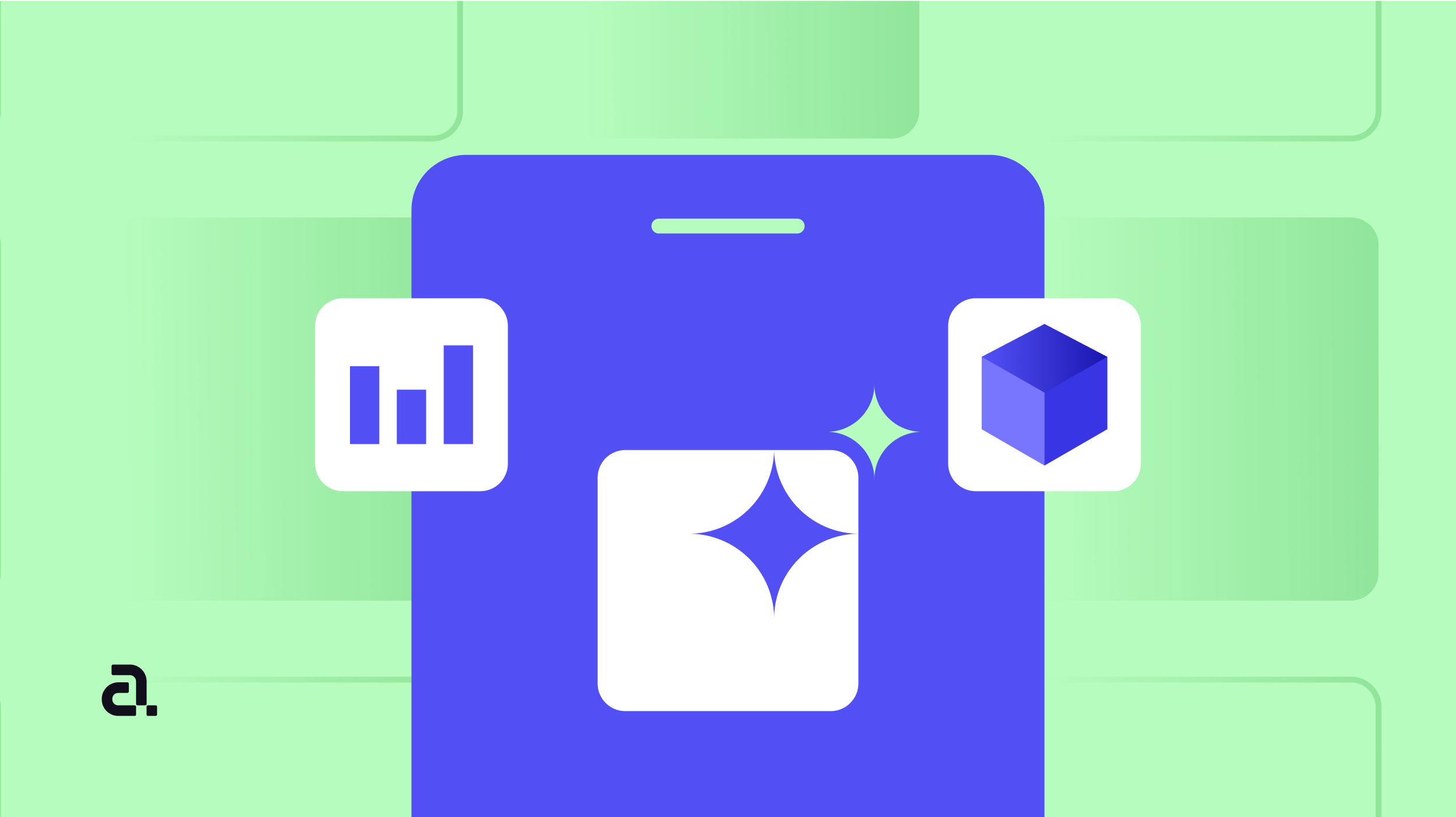For modern enterprises, the pressure to deliver faster support, smarter automation, and more intuitive user experiences has made AI agents not just helpful but essential. Businesses that integrate conversational AI early are finding they can reduce operational costs, elevate customer satisfaction, and unlock new strategic capabilities.
According to McKinsey, companies that adopt AI at scale can increase productivity by up to 40%, and conversational AI is one of the most immediate, high-impact applications of that potential. From financial services to healthcare, logistics to legal, benefiAI agents are driving measurable business outcomes, and the momentum is only accelerating.
This blog will break down how conversational AI agents work, where they deliver the most value, and why leading organizations are embedding them across key touch points. We’ll also look at the challenges of implementation, offer real-world use cases, and share how Aubergine helps businesses design and deploy tailored AI solutions.
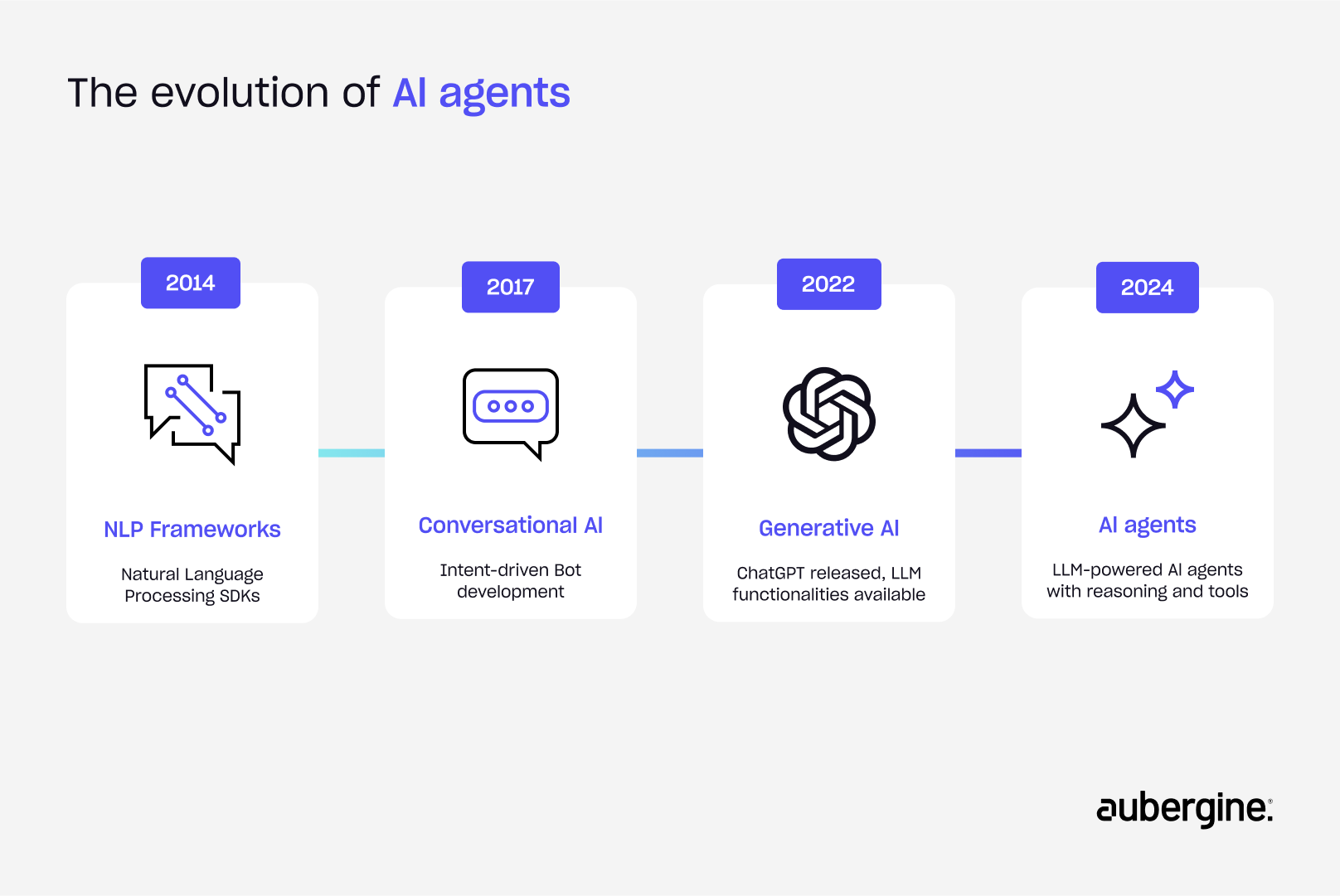
How conversational AI Agents work
A conversational AI agent is not a simple script-based program; it is an intelligent, autonomous system designed to interact with humans naturally. This capability is the result of a powerful convergence of AI technologies, working in concert to create a seamless user experience.
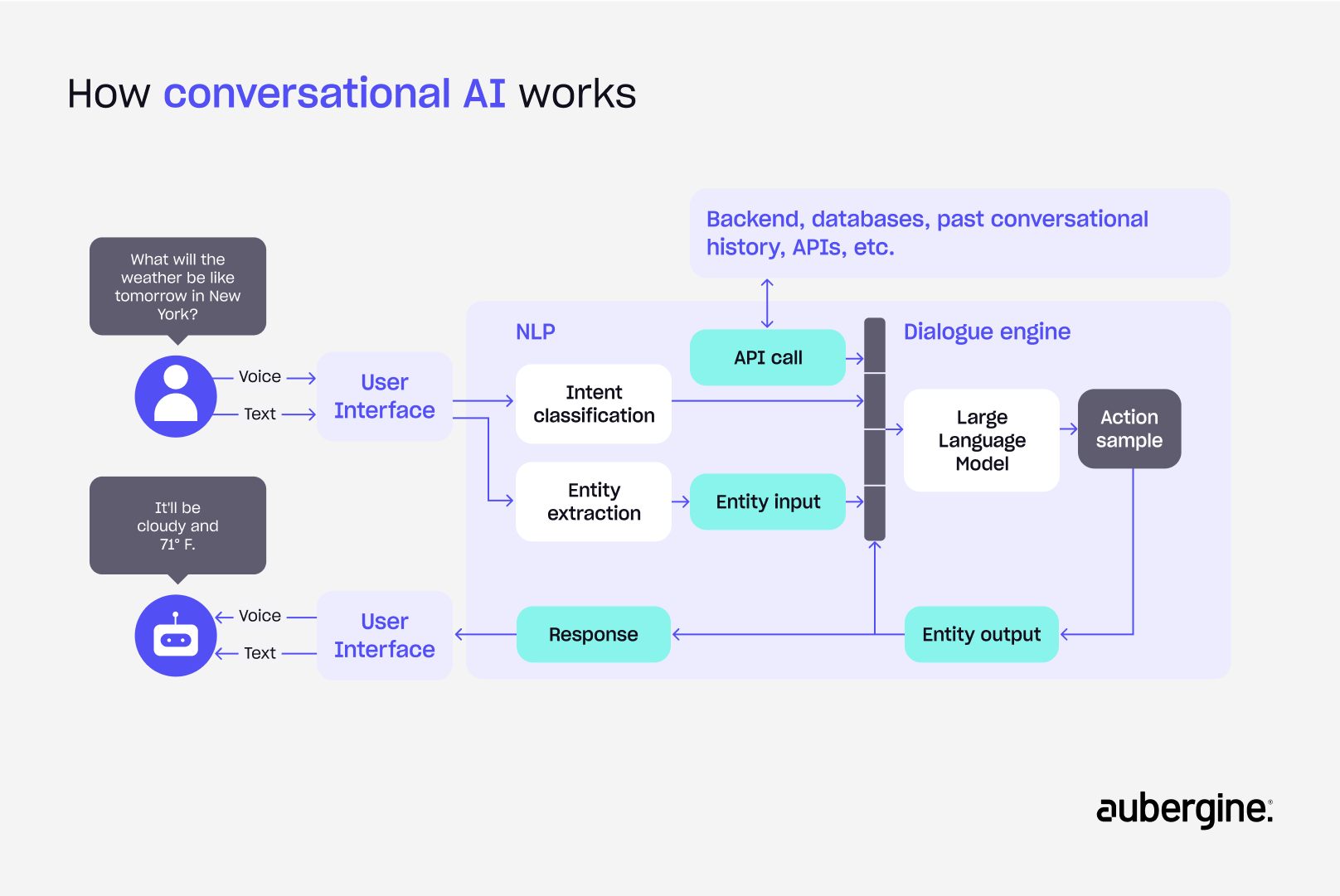
At its core, a conversational AI agent relies on Natural Language Processing (NLP). NLP is the agent's "brain" for comprehension, which breaks down human communication to understand the meaning, intent, and even the emotional state behind a user's message.
The system then follows a continuous loop of understanding, reasoning, and acting. It leverages its Machine Learning (ML) models to formulate a response based on the conversation's context. The most advanced agents use deep learning, which allows them to learn and improve their accuracy with every new interaction continuously. This entire process happens in milliseconds, creating a seamless and intelligent conversational experience.
Benefits of AI agents for enterprises
The global conversational AI market, valued at over $11 billion in 2024, is projected to reach over $41 billion by 2030. Here is a breakdown of the different ways in which conversational AI agents are empowering business:
Financial efficiency
The most immediate and quantifiable impact of conversational AI is on cost optimization. A 2024 study noted that businesses can achieve a significant 30-50% reduction in operational costs by automating their call center and customer service operations. This is a direct result of replacing human-led interactions with AI-powered ones.
The cost per interaction with an AI agent is often less than a dollar, a stark contrast to the average of $5 or more for a human agent. Over millions of interactions, this difference in cost scales dramatically, leading to substantial savings that directly impact a company's bottom line. These savings aren't just limited to agent salaries; they also include the reduced need for physical office space, training, and management overhead, making AI a powerful tool for improving financial health.
Operational efficiency
Beyond cost savings, conversational AI dramatically improves a company's operational efficiency by streamlining processes and freeing up human capital. Case studies from leading financial institutions, such as Bank of America, illustrate this perfectly. Their AI agent, Erica, handled over 330 million requests in six months, taking over 50% of IT support operations.
By handling high-volume work, AI agents significantly reduce the burden on human staff, allowing them to focus on more complex, high-value initiatives that require empathy, critical thinking, and nuanced problem-solving. This reallocation of human resources not only speeds up overall service but also leads to higher job satisfaction for employees who can now engage in more meaningful work.
Unlocking new revenue streams
AI Agents are also a proactive engine for revenue growth. By intelligently engaging customers, these agents can drive sales and increase the average order value.
AI agents analyze customer behavior, purchase history, and browsing data in real-time to offer highly personalized product recommendations. This is more than showing a generic "you might also like" message. Agents can make an accurate, relevant, and timely suggestion that feels helpful to the customer.
One study noted that a retailer's AI chatbot can boost add-on purchases by 25% by intelligently suggesting complementary products. This is a direct and measurable contribution to the company's top line, turning a customer service interaction into a profitable sales opportunity.
Improved employee productivity
Conversational AI agents are fundamentally transforming employee productivity and satisfaction. By acting as internal digital assistants, AI agents can automate a wide range of repetitive and time-consuming tasks. A report from McKinsey found that AI systems can handle up to 70% of routine HR questions, such as those about company policies, benefits, and leave requests. This automation extends beyond HR to other areas like IT support ticketing and report generation.
This shift drastically reduces the time employees spend on mundane administrative work, which not only increases efficiency but also significantly boosts job satisfaction and overall productivity. From drafting emails and generating reports to summarizing meetings and answering internal queries, AI agents act as intelligent assistants that reduce manual workload and context switching.
Data-driven decision making
Every interaction with a conversational AI agent is a rich, structured data point. This real-time stream of information offers an unprecedented window into the voice of the customer.
By analyzing the data from millions of conversations, businesses can gain deep insights into customer needs, emerging pain points, and product feedback. This intelligence is invaluable for informing product roadmaps, optimizing innovation, and making agile, data-driven decisions that keep the business ahead of the curve.
Key use cases of conversational AI agents
The versatility of modern AI agents allows them to be deployed across a spectrum of business and product use cases to drive efficiency, enhance engagement, and unlock new insights. The following areas demonstrate the breadth of their strategic application, organized by their primary business function.
Customer engagement and support
In high-volume industries like financial services, telecommunications, and e-commerce, conversational AI agents provide a scalable way to handle a massive number of customer requests. The most significant impact is on efficiency and cost.
For example, Vodafone's virtual agent, TOBi, handles over 45 million customer conversations each month, significantly reducing the workload on human agents. This automation allows companies to resolve up to 80% of routine inquiries, freeing human teams to focus on complex, high-value cases.
Conversational IVR and smart call routing
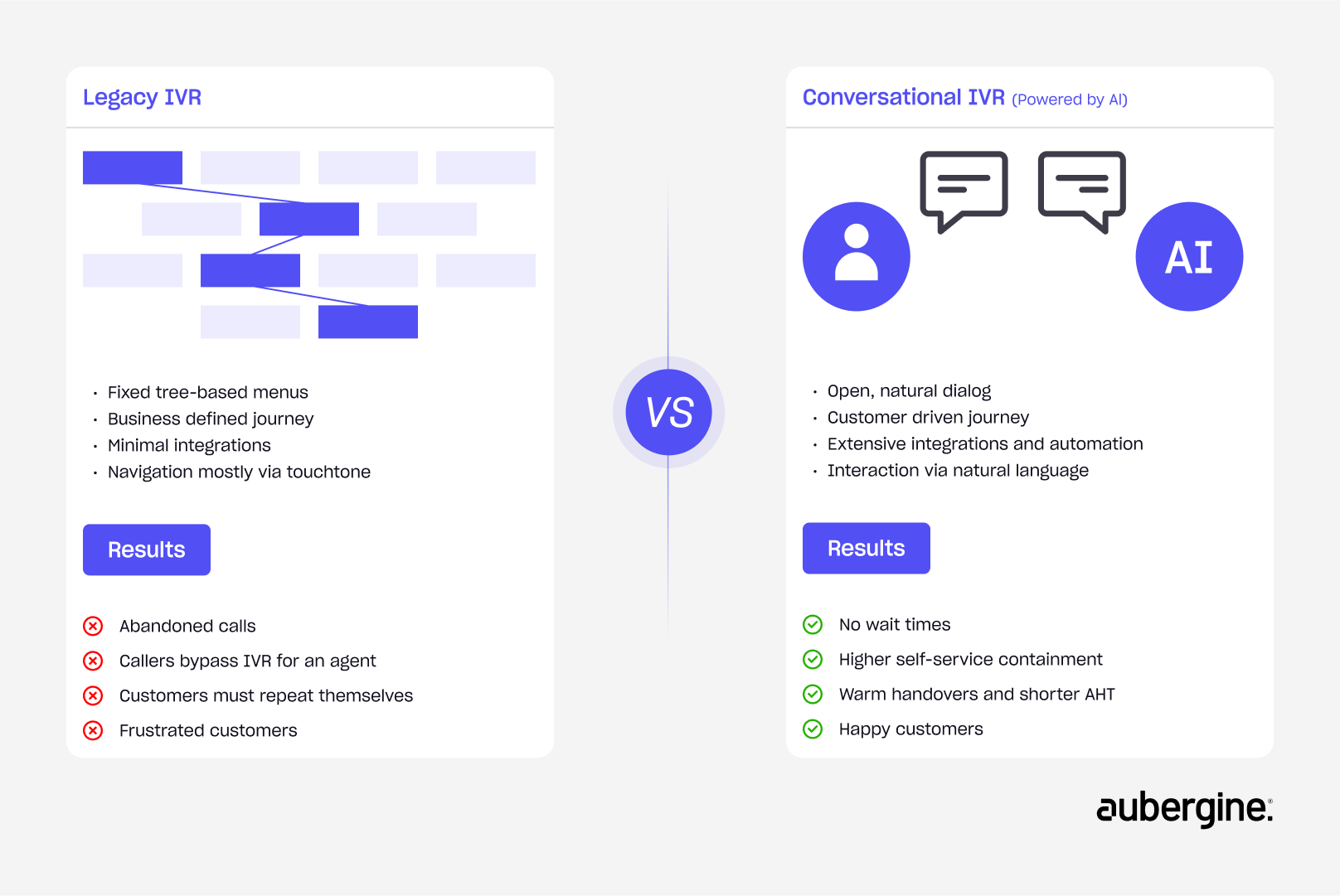
The sophistication of conversational AI agents also extends to how they manage incoming calls. By replacing outdated touch-tone menus with an AI-powered Interactive Voice Response (IVR), businesses can create a more natural and efficient experience. Here’s how it works:
Using Natural Language Understanding (NLU), these AI agents can instantly comprehend a customer's request from their natural speech. Instead of having to navigate a confusing menu, a customer can simply state their need, like, "I need to dispute a charge on my credit card" or "I want to track my recent order."
The system then uses intent recognition to analyze the request and route the customer directly to the right department or resource. This eliminates frustrating hold times and ensures customers are connected to the right help immediately, creating a more dynamic, efficient, and personalized experience.
Sales automation
Conversational AI agents have become a vital strategic tool for sales teams, moving beyond basic lead qualification to deliver real-time insights that manage the entire sales cycle.
Pipeline management and predictive forecasting
For modern enterprises, the health of the sales pipeline is paramount. Conversational AI agents transform this process by acting as an intelligent layer within the CRM. Using advanced analytics, they analyze both structured data (deal stage, value) and unstructured data from sales conversations (via NLP) to assess deal velocity and risk.
Furthermore, companies that use AI for sales predictions report an accuracy rate of 79%, a significant leap from the 51% accuracy achieved through conventional methods.
Scaling sales velocity
Beyond strategic insights, AI agents automate the administrative burden that slows down a sales team. They can handle mundane tasks like post-call summarization, CRM data entry, and meeting scheduling.
By offloading these repetitive duties, AI can reduce operational costs and free up human talent to focus on what they do best: building relationships, handling complex objections, and closing deals. The sales agent becomes a partner, providing real-time data and actionable insights that empower the sales rep to be more effective and productive
Enterprise operations
AI agents are a powerful productivity multiplier for enterprise operations, streamlining workflows and empowering employees across departments. They serve as tireless digital assistants, offloading repetitive tasks and freeing human talent to focus on more critical and strategic tasks.
Human resources and internal support
AI agents are fundamentally transforming internal support functions. In Human Resources, they automate resume screening and provide instant answers to employee questions about benefits or company policies, which can cut HR work time by up to 35%.
For IT, an AI agent acts as a 24/7 help desk, automatically handling routine support tickets and allowing technicians to address more complex issues.
Business intelligence
Conversational AI agents democratize data access for every employee, not just analysts. By acting as a central hub for information, they enable non-technical users to access and understand complex data with a simple query.
For instance, an employee can simply ask, "What were our sales figures for the last quarter?" and the AI agent will instantly generate a clear, relevant report. This capability transforms raw data into actionable insights, empowering teams across the organization to make faster, more informed decisions without needing to navigate complex dashboards or wait for a data scientist.
Core operations
The value of AI is also deeply felt in a company's foundational operations, streamlining critical workflows across departments.
In finance, AI agents automate time-consuming, repetitive tasks like invoice processing and expense reports, which can lead to a significant 50% decrease in manual activities.
For the supply chain industry, AI agents optimize logistics, from inventory management to delivery routes, and predict demand with greater accuracy. This predictive capability can reduce forecasting errors by as much as 50%, ensuring that businesses are better prepared for market fluctuations and can operate more efficiently.
Legal compliance and risk management
In highly regulated sectors, AI agents are a vital tool for ensuring compliance and mitigating risk. They can automate data-intensive tasks such as reviewing contracts to flag key clauses and cross-referencing internal documents against regulatory frameworks.
This is a top priority for many firms, with 68% of financial companies citing AI in risk management as a key focus.
IT and security operations
Conversational AI agents are becoming indispensable for IT and security teams. They streamline IT support by automating password resets, troubleshooting common software issues, and managing support tickets, leading to faster resolution times and freeing up IT staff.
For example, some companies have seen a 70% reduction in help desk tickets by using AI-powered virtual agents to handle routine requests. In security, these agents serve as a frontline defense, monitoring for suspicious activity and providing immediate alerts. They can also automate the initial response to security incidents, such as isolating a compromised device or running a preliminary diagnostic scan.
Challenges in implementing conversational AI agents
In this final section, we'll address the critical challenges that can arise when implementing conversational AI. A strategic and proactive approach to these issues is essential for any business aiming to realize the full value of its AI investment.
Aubergine AI agents
The challenges of implementing conversational AI agents are real, but they are also navigable with the right strategic partner. At Aubergine, we don't just see AI agents as tools; we see them as strategic assets that augment human potential.
Our expertise lies in architecting intelligent, scalable, and secure AI solutions that move your business forward. We invite product leaders to explore how our advanced AI agents can be tailored to a multitude of use cases, from enhancing customer support with a Knowledge Base Support Agent to turning data into actionable insights with a Data Insights Agent.
Let's work together to unlock the transformative power of AI agents for your next digital solution.
